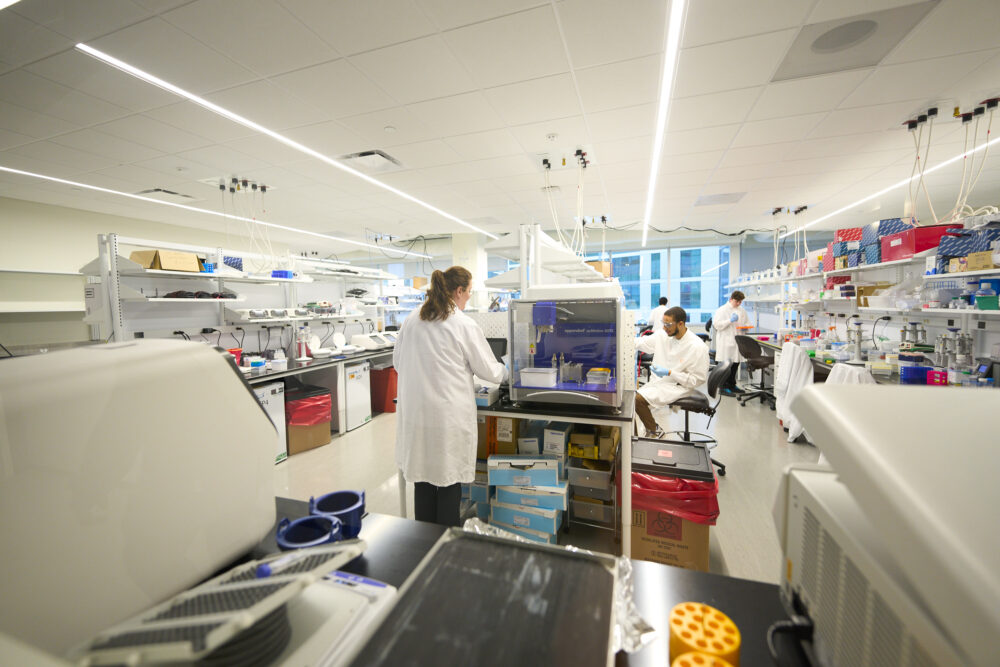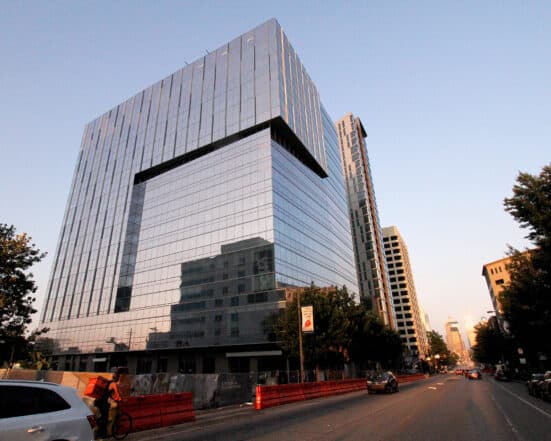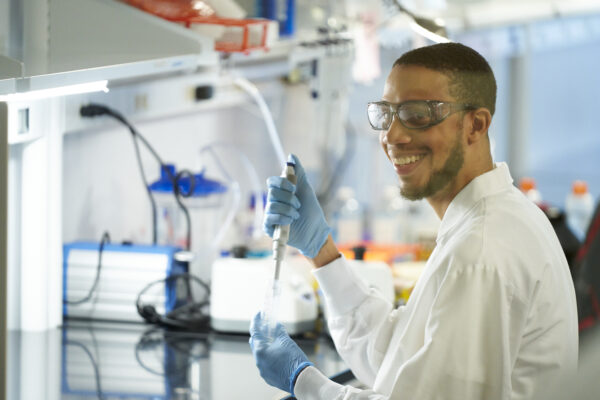For life sciences, biotech, and biopharmaceutical companies, researchers, and startups, finding the right lab space is an important task.
One of the first questions to consider is what kind of space is needed. There are essentially three options to be aware of:
- Building and operating a private lab: These spaces are leased or purchased and require you to build out the space, lease or buy equipment, and run operations.
- Leasing private lab space from a flexible lab space provider like CIC: Your company has its own dedicated lab, but many operational tasks are managed by the flexible workspace provider. These options often have additional benefits like access to specialized equipment, the option to lease office space for non-lab tasks, and communal areas like kitchens that allow for networking.
- Renting shared lab space: You can lease any number of benches in shared facilities that offer access to equipment and proximity to other organizations.
The cost of lab space can induce sticker shock if you aren’t ready for it, and the total investment required to set up and outfit a lab can feel overwhelming. Though square footage is an important consideration for lab space, it is not the only factor at play.
Here are five other factors that are essential to consider when evaluating your lab space options.
1.) Will you have access to equipment and be responsible for upkeep?
Scientific equipment can be costly to acquire or lease. It also takes time, effort and money to keep up with maintenance and deal with vendors. Building a private lab on your own will mean shouldering these costs.
Leasing lab space can defray these costs if equipment access is included. CIC members who lease lab space have access to shared equipment, without the headache of coordinating with vendors for service, maintenance, and repairs. Beyond these services, CIC sponsors also offer training on equipment and are available to build long-term relationships that benefit future equipment needs.
Shared lab space may also offer access to specialized equipment that can help accelerate life sciences work. For example, CIC recently expanded its partnership with ZEISS to bring state-of-the-art microscopy equipment to the CIC Labs + Innovation Campus in Philadelphia. CIC Labs + Innovation Campus in St. Louis has recently renovated its lab spaces with the support of partner Cortex and long-standing sponsor Thermo Fisher Scientific.
It’s also important to consider aspects of lab upkeep like waste management and disposal, permitting, and licensing. If you know that you will have biohazardous and/or chemical waste, for example, you will need to factor in the costs of getting a license to handle that type of waste and the cost to dispose of the type and amount of waste safely. CIC holds the generator licenses at our sites to expedite the process of starting up a lab and ensuring all waste streams can be properly disposed of.
Factoring in these costs is important as you evaluate options for lab space, as costs can add up quickly. These aspects can cut into your runway and require employees to take their focus off your work.
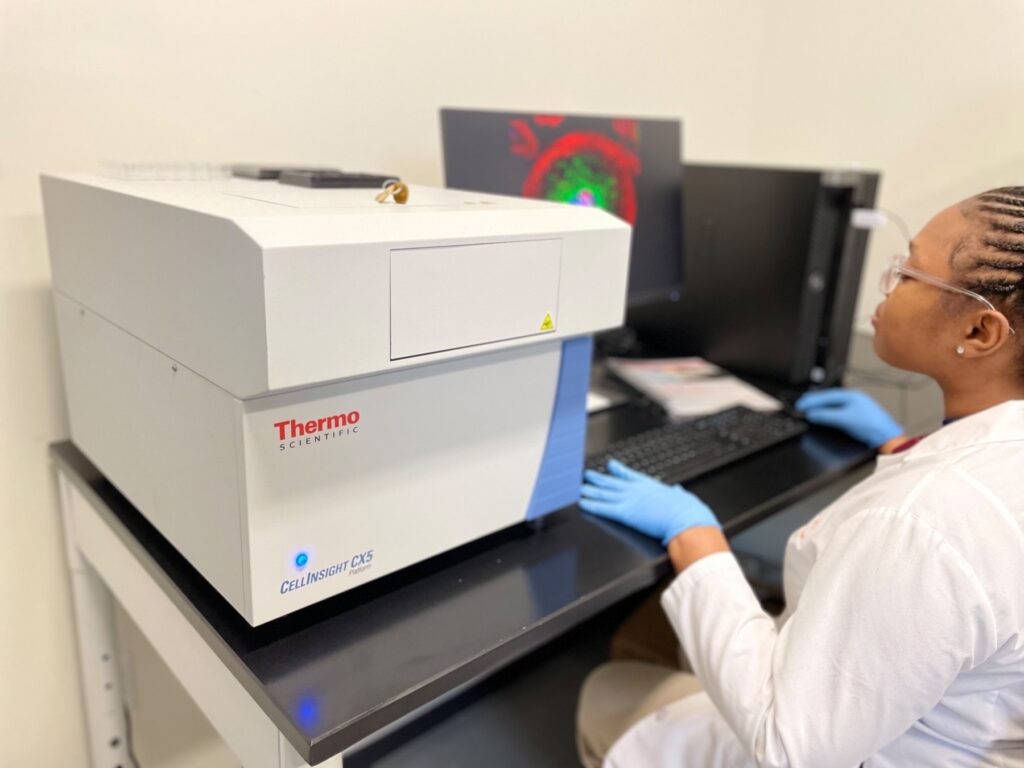
2.) Is there a life sciences community and mentorship available?
Though some may prefer standalone private lab space, shared lab providers offer a greater sense of community that can help accelerate innovation and discovery. If you choose to lease a space within a shared lab space, you may end up connecting with others in that setting. Connections to a community make for a more dynamic environment that creates a collegiate-like lab culture.
“Being in a shared lab setting provides opportunities for cross-disciplinary collaboration; it breaks down barriers and encourages communication and interaction between researchers from diverse fields,” Michelle Ottey, CIC vice president of labs and centers in the US, wrote in the Business Journals of the value of collaborative science in shared facilities.
In addition, consider whether you have easy access to local events for innovators like you. Each year, CIC Philadelphia hosts a vendor showcase event that gathers innovative life science companies and organizations to support the local biotech sector, as one example.
Many CIC members around the world attend Venture Café events designed to spark conversation and networking. CIC St. Louis recently launched a new event series – SuperCollider – to provide space for discovering common ground and moving innovation forward.
3.) Does your space offer flexibility as your needs grow and change?
Building your own lab from scratch comes with many costs, from outfitting your own lab to locking into a long term lease that can be difficult (and costly) to break if you outgrow the space or your needs change.
Cushman & Wakefield analyzed the average fit out costs for life sciences space across six of the top life sciences markets in the US, finding an average fit out cost of $837 psf. This is often more expensive in larger markets, such as San Francisco where the average fit out cost for life sciences space is $973 psf.
It may be beneficial to consider externally managed flexible lab space, like that offered by CIC that can scale up or down to meet changing lab or company needs. You may find that you need office space for your team outside of bench scientists to support your startup’s next growth stage.
With a global footprint, CIC can help you navigate domestic and international growth and accommodate changing space needs. Access to international markets and innovation clusters can be helpful for companies ready to expand their global presence.
Though oncology innovator Akamis Bio did not look for lab space in the US, it did look for flexibility in leasing office space to establish a presence in the US market. “Being able to focus the bulk of my energy and time on [making medicines for cancer], and not dealing with facility issues, IT or logistics means a lot. It means that I can be focused on the business and bringing medicines forward for patients,” said CEO Howard Davis.
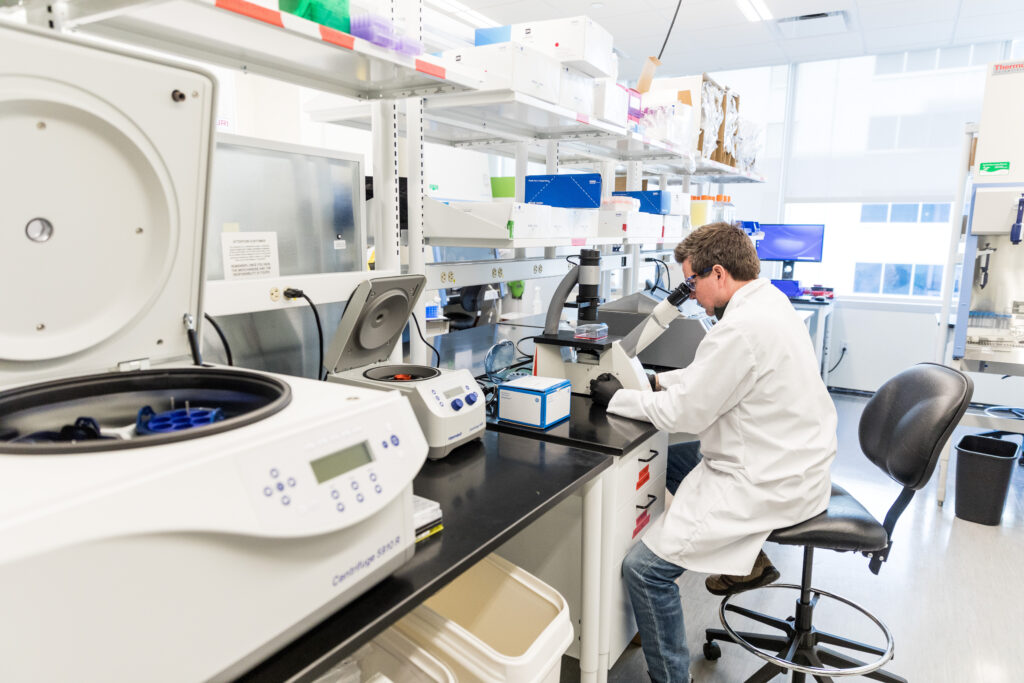
4.) What is the neighborhood and ecosystem around the lab space like?
Your lab space will not exist in a vacuum. From scoping out the local restaurant scene to ensuring there is some outdoor space for a daily walk, take the time to consider the surrounding neighborhood and the amenities it offers.
Examples of factors about the area surrounding your lab to consider:
- Transportation: What modes of transportation are available and are they reliable? How close is an airport and does it offer convenient routes and flight options for your needs?
- Talent: What colleges or universities are nearby? Do they have a specialized area of study that aligns with your work?
- Potential partners: Are there larger companies, hospitals, or other potential partners nearby? Will you have opportunities to benefit from the “bump factor”?
According to JLL’s U.S. Life Sciences Property Report, neighborhood quality in the Bay Area and Boston are some of the reasons that drive life sciences leasing activity in these areas even in a down market.
While traditional life science epicenters like Cambridge, Massachusetts and San Francisco, California, tend to be popular, there are successful life science clusters across the country that may be a great location for your organization. Cities like Philadelphia, Pennsylvania, St. Louis, Missouri or Durham, North Carolina have become popular destinations for those needing lab space.
5.) What other amenities inside the building will you have access to?
You’re likely familiar with key amenities your company will need like biosafety cabinets or chemical fume hoods. It’s also important to consider the technological infrastructure included in the space you plan to lease.
If you have a dispersed team, you may want to consider if there are spaces for hybrid collaboration. For example, consider whether high-speed Wi-Fi is included or if you will need to invest in installing networks on your own time and expense.
Beyond scientific spaces, you may need spaces to meet with investors, grab a meal and take calls. Creating and furnishing spaces like conference rooms and kitchens require additional resources and time.

Culture is a critical component of work settings, whether lab space or offices. A strong company or lab culture helps retain employees, generate innovative ideas, and is instrumental to company success.
Shared lab space options allow access to premade culture-driving spaces, instead of an empty floor plan you need to design yourself. The nature of flexible lab space providers means that members are able to facilitate community and connection in shared spaces like the kitchen and at events or programming hosted on-site.
Find the right lab space for your needs
Choosing a lab space is about more than square footage alone. Consider the location, your flexibility in that space, the community surrounding your potential lab, and access to equipment and amenities. As part of your lab space evaluation process, be sure to check out our CIC Labs + Innovation Campuses in Philadelphia and St. Louis.
